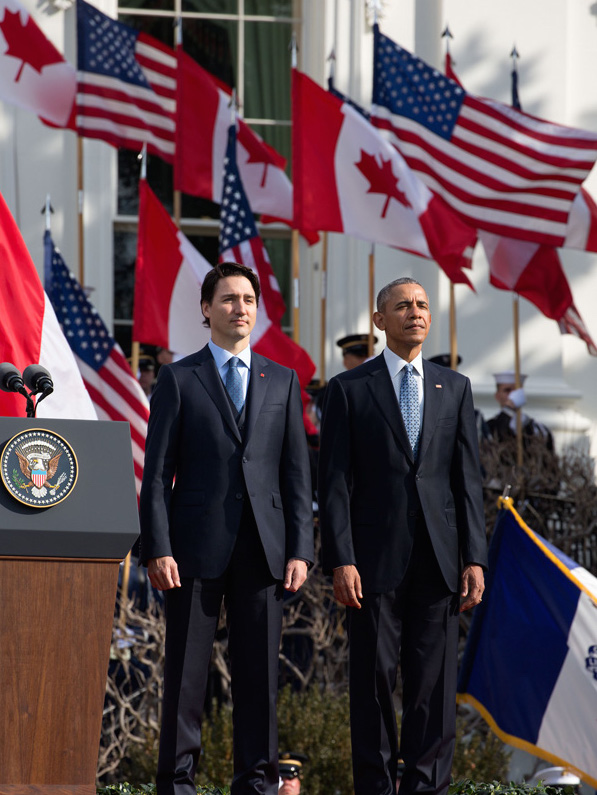Like this article? rabble is reader-supported journalism. Chip in to keep stories like these coming.
Two spectral presences appeared during Justin Trudeau’s visit to Washington, one Canadian and one American. You could almost see them onscreen, then they frustratingly faded, as spectres do.
The first was Stephen Harper. He (or it) flickered on the White House lawn during President Barack Obama’s welcome. Obama called it the “first official visit” by a Canadian leader in almost 20 years and — revelling in his inner Canadian — “about time, eh?” They joked about hockey and Obama added he was proud to say the U.S. finally has (almost) universal health care just like Canada’s. You can see why the spirit of Harper was provoked to rise and scowl.
Harper visited Washington often in his official capacity but never, apparently, officially enough. He had a decent relationship with the prez, at least in the Bush years, but W. spoiled that by calling him “Steve,” in public, something no one has done before or since. He was the most wannabe American PM we’ve ever had, even more than Brian Mulroney. But it’s Justin Trudeau who’s adored down there, precisely because he’s seen as so “Canadian.”
There was something obstinate and principled in Harper’s refusal to embrace what’s widely viewed as Canadian: the niceness, peacemaking, public programs, good will toward Syrian refugees etc. He was never comfortable with it and made it his mission to change: to remake the meaning of Canadian both concretely and symbolically. Now he’s gone and his projects, like a garish anti-Communism monument for downtown Ottawa or Afghan war and Victoria Cross memorials, are relocated or in limbo. His passion — to reconfigure what Canadian means — turned out, at least in that nine-year incarnation, quixotic.
Cartoonist Terry Mosher (Aislin) caught it with an image of Harper driving through a Calgary fast food place at the very moment of the Trudeau state dinner in D.C. and hearing: “Fries with that, Mr. Harper?” This was the true coda to the Harper years and his avatar surely had to make an appearance.
The other ethereal presence manifested during Thursday’s joint press conference. This was Bernie’s ghost — as in Banquo’s ghost in Macbeth, though Bernie Sanders isn’t dead, just aging vigorously. You sensed its presence by the constant reversion to talk about trade deals like the TPP, now pending approval.
Obama said they agreed to “move forward” with it and Trudeau chimed in that the original U.S.-Canada trade deal of 1988 was “one of the great things” both have done. It seemed gratuitous, no one had really asked. Had they spoken at their meeting about Sanders’ stunning upset in Michigan over Hillary Clinton, based on the disgust of workers there with trade deals? When those deals were first struck, assurances were given that it would all be good; now after 30 years of experience, the horrible results for workers are inescapably clear. Did they mutually confess anxiety about the political impacts, exemplified by Bernie?
Obama kept going back to it. “I believe there have been bad trade deals in the past” that “served the interests of global corporations and not workers,” he said — as if Bernie was sitting on his shoulder, chirping like Jiminy Cricket. “We can’t put up walls,” he went on — which isn’t the point; the point, as Bernie says, is to have deals not exclusively dictated by corporate interests. Then Obama added that he’s against deals “busting up unions” with “tax breaks for the wealthy.” By then it was more like Bernie’s dybbuk was inside him. Maybe it was strategic and election-directed, but Bernie had definitely got into his head.
I think Obama has been admirable in many ways, including his flawed health-care reform and his openings to Iran and Cuba. But he’s been cowardly about confronting Big Money and on anything that ran counter to their wishes. Now he and Trudeau want to burnish their place in history by doing some “progressive” things with climate and environment. Both are also committed to inclusiveness.
But it may have little lasting effect if the lives of ordinary people continue to deteriorate, as they have during 30 years of “free” trade deals. For most of that time, one could try to separate worthy causes like inclusion and climate from the steady economic decline. But it’s become harder to do that, and that crusty, disembodied voice of Bernie Sanders wasn’t letting anyone forget it.
This column was first published in the Toronto Star.
Photo: Chuck Kennedy/White House/ Wikimedia Commons
Like this article? rabble is reader-supported journalism. Chip in to keep stories like these coming.



